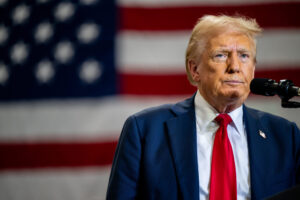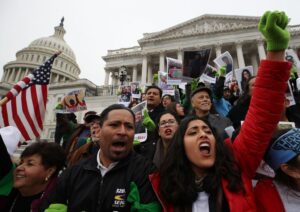16:13
News Story
NY judge spars with Trump lawyers over gag order in criminal trial

Former U.S. President Donald Trump appears in court for his trial for allegedly covering up hush money payments on April 23, 2024, at Manhattan Criminal Court in New York City. Trump faces 34 felony counts of falsifying business records in the first of his criminal cases to go to trial (Brendan McDermid-Pool/Getty Images).
The judge overseeing Donald Trump’s criminal case in New York appeared to strongly disagree Tuesday with the former president’s lawyers’ explanation for why he should be considered in compliance with a gag order in the case.
In a Tuesday morning hearing to determine whether to fine Trump for violating the order, Judge Juan Merchan warned Trump’s legal team it was “losing all credibility with the court” for failing to provide any backing for its argument.
Trump has routinely posted on his social media platform, Truth Social, to complain about the case, despite a gag order that prohibits him from making public statements about potential witnesses.
Trump faces 34 felony counts of falsifying business records for reimbursing his attorney and personal fixer at the time, Michael Cohen, for a $130,000 payment to adult film star Stormy Daniels. It is the first criminal trial against a former U.S. president.
Trump has posted on social media to criticize Cohen and Daniels, as well as reposting articles and video clips that disparage the case entirely.
Trump attorney Todd Blanche argued Tuesday that many of Trump’s posts were sharing others’ content, including a clip from the Fox News host Jesse Watters that complained of supposed unfair treatment toward Trump.
Merchan asked Blanche why sharing content should be considered different from Trump using his own words to violate the order. The judge asked Blanche if there was case law to back up his argument.
Blanche said he had none and called it “common sense,” according to reporters in the courtroom.
Trump was trying hard to comply with the gag order, Blanche said.
“You’re losing all credibility with the court,” Merchan responded, according to reports.
Prosecutors have asked Merchan to fine Trump $1,000 for each violation of the gag order and to warn him that future violations could lead to jail time.
Merchan did not rule on the issue Tuesday.
After the trial wrapped for the day, Trump re-aired his complaints about the order.
“I think it’s a disgrace, it’s totally unconstitutional,” Trump told reporters leaving the courtroom. “I’m not allowed to defend myself and yet, other people are allowed to say whatever they want about me. Very, very unfair.”
Second day of testimony
The jury of 12 New Yorkers was absent for the arguments on the gag order but arrived to hear a second day of testimony from David Pecker, the former publisher of the tabloid National Enquirer.
Pecker had for years protected Trump from damaging stories, including those involving extramarital affairs, by buying the rights to such stories and not publishing them. The exercise is known as catch and kill. It is made possible by National Enquirer’s practice, unlike mainstream news outlets, of paying sources for the rights to stories.
Prosecutors sought to establish Trump and Pecker had a deal that was aimed at protecting Trump’s reputation into the 2016 election.
That would bolster prosecutors’ argument that Trump paid Stormy Daniels, an adult film star who says she had an affair with Trump, in return for her silence in the closing weeks of the election.
Pecker testified Tuesday that he met with Trump and Cohen in 2015 and the three came to an “agreement among friends” that Pecker would seek to catch and kill potentially damaging stories to Trump.
He did so twice, he said.
He paid $30,000 to a doorman at Trump Tower who shared a rumor that Trump fathered a child out of wedlock.
And he paid $150,000 to a former Playboy model who said she had a long-term affair with Trump, he said, according to reports.
The tabloid also completely fabricated a story meant to help Trump, Pecker testified.
He said a 2016 story linking the father of Trump’s then-rival for the GOP nomination, Texas Sen. Ted Cruz, to the 1963 assassination of President John F. Kennedy was “created” by manipulating unrelated photographs, NBC News reported.
Pecker said he took direction from Cohen on which primary opponents to target with negative stories.
Our stories may be republished online or in print under Creative Commons license CC BY-NC-ND 4.0. We ask that you edit only for style or to shorten, provide proper attribution and link to our website. AP and Getty images may not be republished. Please see our republishing guidelines for use of any other photos and graphics.




